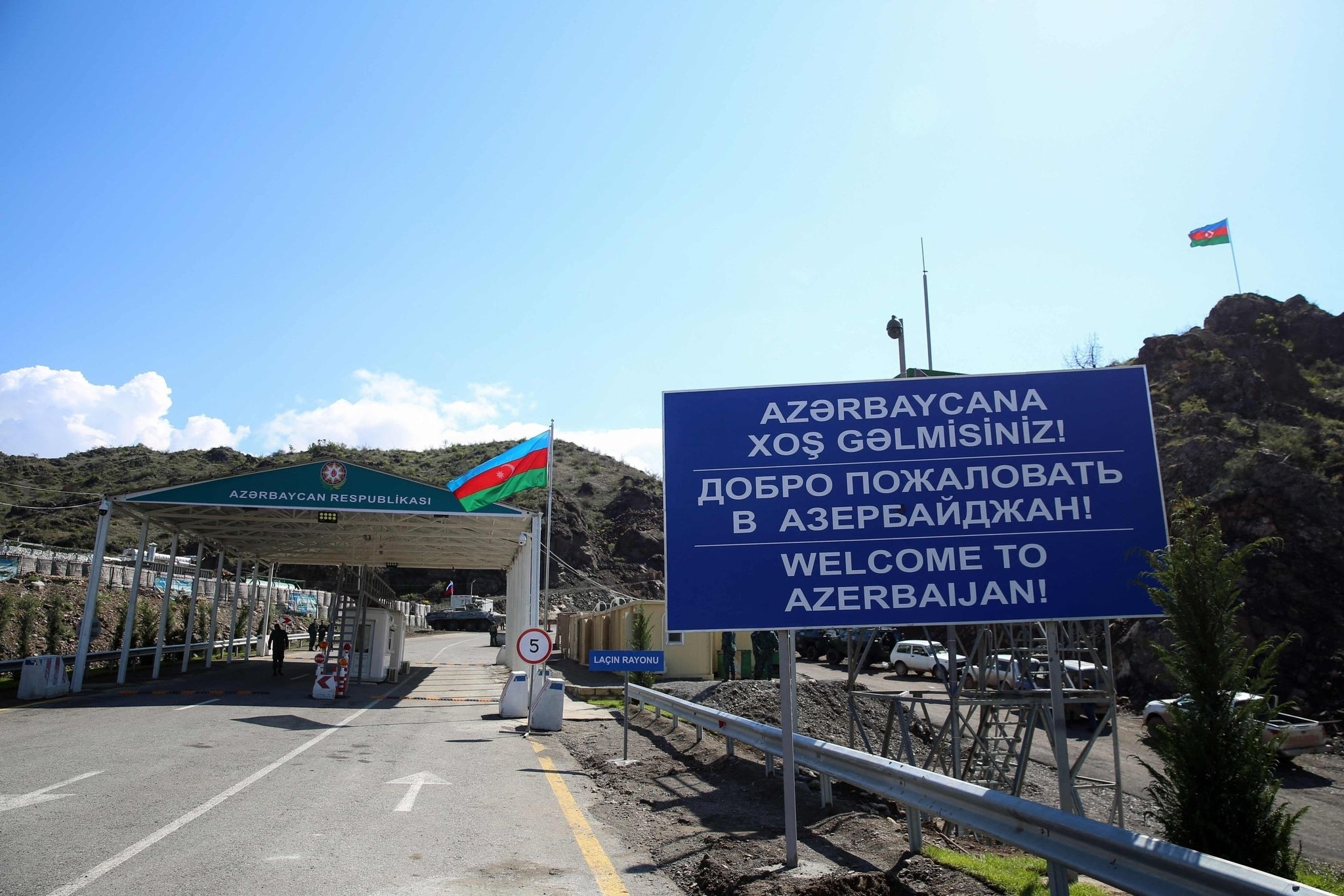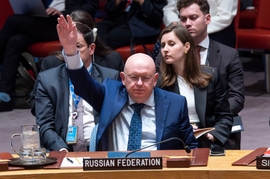The illegal separatist regime in the Karabakh (Garabagh) region of Azerbaijan announced its self-dissolution on Thursday.
A relevant decree was signed by the regime's self-proclaimed "president," Samvel Shahramanyan. The document states, "All institutions and organizations are to be dissolved by January 1, 2024, and the Republic of Nagorno-Karabakh (Artsakh) ceases to exist."
It also calls on the Armenian residents of the Karabakh region to become acquainted with the conditions of reintegration presented by Azerbaijan in order to subsequently make an independent and individual decision on the possibility of staying in (returning to) the Karabakh region.
The dissolution of the decades-old illegal separatist regime in the territory of Azerbaijan came as the culmination of the latter's recent anti-terror measures and ensuing reintegration efforts.
From September 19 to 20, the Azerbaijan Armed Forces conducted a counter-terrorism operation in the Karabakh region to disarm the remnants of the Armenian army. The operation followed the intensifying Armenian attacks on Azerbaijani positions and the recent deadly mine incidents, resulting in the deaths of Azerbaijani police officers and road construction workers. By the cessation of hostilities, dozens of military posts, strongholds and equipment of the illegal military formations were disabled.
On September 20, the so-called "defense forces" of the separatists surrendered, agreeing to full disarmament and withdrawal. Since then, the Azerbaijani army, in coordination with the temporary Russian peacekeeping mission in the Karabakh region, has been confiscating arms, ammunition, and equipment from the Armenian army formations. The process will reportedly continue until the illegal armed formations are completely disarmed and removed from the territory of Azerbaijan.
The Karabakh region was outside of Azerbaijan's control for nearly three decades. During this period, the region was illegally occupied and ruled by Armenia and the separatist regime established and backed by the Armenian authorities. The occupation of the Karabakh region by Armenia was the result of an illegal territorial claim by Armenians with its roots dating back to the Soviet era.
Separatist sentiments in the highland part of the Karabakh region of Azerbaijan rose after it was given the status of so-called Nagorno-Karabakh Autonomous Oblast (Region) within Azerbaijan by the Soviet rulers in 1923. As a result of continuous relocation of Armenians to the region, they began to claim the Azerbaijani lands as their own. The anti-Azerbaijan sentiments expanded over the years until the late 1980s and early 1990s when it grew into a full-blown war between Armenia and Azerbaijan.
Following the dissolution of the Soviet Union in 1991, Armenia launched a military aggression against Azerbaijan. The bloody war, which lasted until a ceasefire in 1994, resulted in Armenia occupying 20 percent of Azerbaijan's internationally recognized territories, including the Karabakh region. Over 30,000 ethnic Azerbaijanis were killed and 1 million others were expelled from their lands in a brutal ethnic cleansing campaign conducted by Armenia.
Armenia designed an illegal separatist "government" in the occupied Karabakh region, throwing military and financial weight behind it to consolidate the occupation. Certain parts of the Armenian military were deployed in the region to form the so-called "defense forces." The separatists were also assisted in establishing their bogus "executive, legislative, and judiciary" structures. By 2023, five self-styled "presidents" were "elected" to rule the separatist regime. The last illegal "elections" took place on September 9, 2023, with Samvel Shahramanyan becoming the next "president" to fill the shoes of the resigned Arayik Harutunyan. The separatists sought "independence" from Azerbaijan, claiming the Karabakh region should never be part of the country.
On September 27, 2020, the decades-old conflict between Armenia and Azerbaijan escalated when Armenia's forces deployed in occupied Azerbaijani lands shelled military positions and civilian settlements of Azerbaijan. During counter-attack operations, Azerbaijani forces liberated over 300 settlements, including the cities of Jabrayil, Fuzuli, Zangilan, Gubadli, and Shusha, from nearly 30 years of illegal Armenian occupation. The war ended with a statement signed on November 10, 2020, under which Armenia also returned the occupied Aghdam, Kalbajar, and Lachin districts to Azerbaijan.
According to Azerbaijani data, up to 25,000 ethnic Armenians live in certain parts of Azerbaijan's Karabakh region, temporarily monitored by the Russian peacekeeping contingent. Armenia demanded so-called status for this area post-war, while Baku rejected these claims as a threat to the territorial integrity of Azerbaijan.
Since late 2020, Azerbaijani authorities have been calling on ethnic Armenians residing in the Karabakh region to eliminate anti-Azerbaijan propaganda and take steps to become part of Azerbaijani society. The Azerbaijani government and people consider the territory partially settled by the Armenian residents as the Karabakh region and the Armenian residents living there as Azerbaijani citizens.
Azerbaijani authorities initiated the reintegration of Karabakh Armenians by arranging a meeting between officials from Baku and representatives of the Armenian residents in the region. The meeting in the town of Khojaly on March 1, 2023, discussed the reintegration of the Armenian residents of the Karabakh region into Azerbaijani society in line with the Constitution and laws of Azerbaijan. The sides agreed to continue contact in the next meetings. The Azerbaijani government even suggested that it take place in Baku. However, due to the refusal of the Armenian side, the process ended in a deadlock.
Following the counter-terrorism measures on September 19-20, the meetings between officials from Baku and representatives of the Armenian residents of the Karabakh region have been resumed.







 Azerbaijan and Armenia started the process of demarcation of their border on Tuesday, with the installation of the first border markers based on ge...
Azerbaijan and Armenia started the process of demarcation of their border on Tuesday, with the installation of the first border markers based on ge...
 President Aliyev emphasized the critical role of the North-South Transport Corridor in fostering transport cooperation between Azerbaijan and Russi...
President Aliyev emphasized the critical role of the North-South Transport Corridor in fostering transport cooperation between Azerbaijan and Russi...
 Iran and Pakistan have signed eight cooperation documents in various fields, and agreed to strengthen ties to fight terrorism in the region.
Iran and Pakistan have signed eight cooperation documents in various fields, and agreed to strengthen ties to fight terrorism in the region.
 As the conflict between Ukraine and Russia escalates, the strategic importance of Kharkiv, Ukraine's second-largest city, has come sharply into focus.
As the conflict between Ukraine and Russia escalates, the strategic importance of Kharkiv, Ukraine's second-largest city, has come sharply into focus.
 Iranian President Ebrahim Raisi expressed Tehran’s readiness to participate in significant development projects in Sri Lanka during the inauguratio...
Iranian President Ebrahim Raisi expressed Tehran’s readiness to participate in significant development projects in Sri Lanka during the inauguratio...



